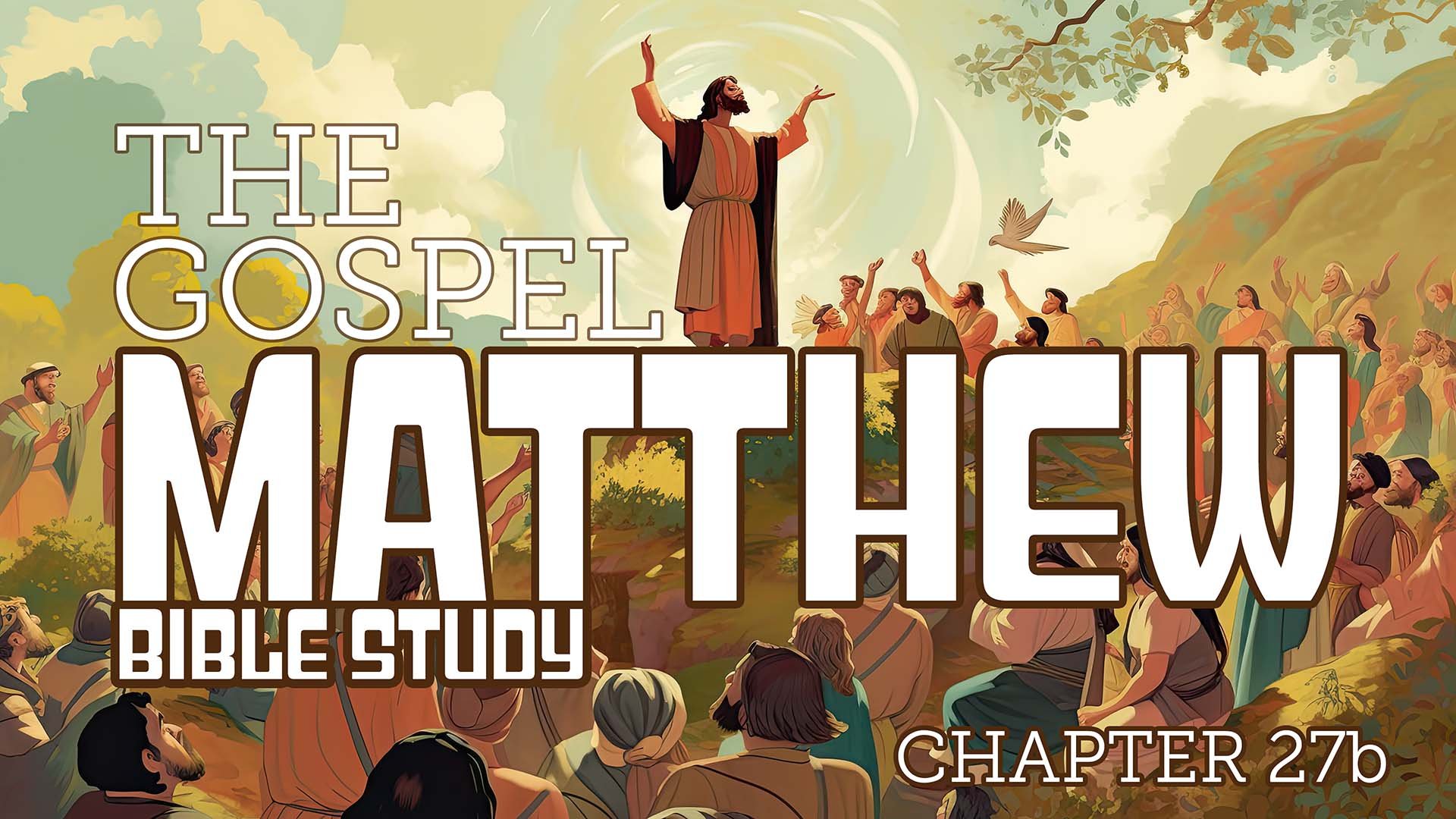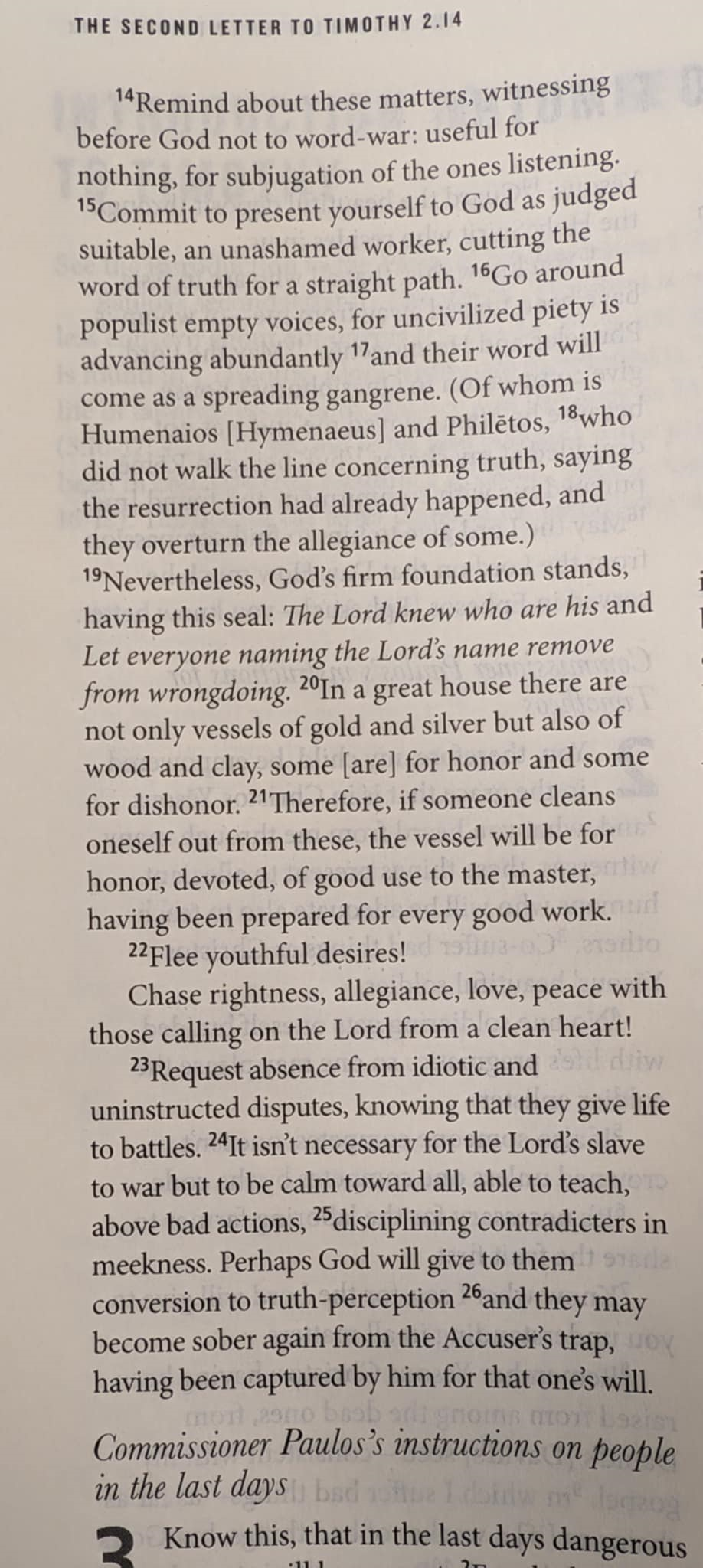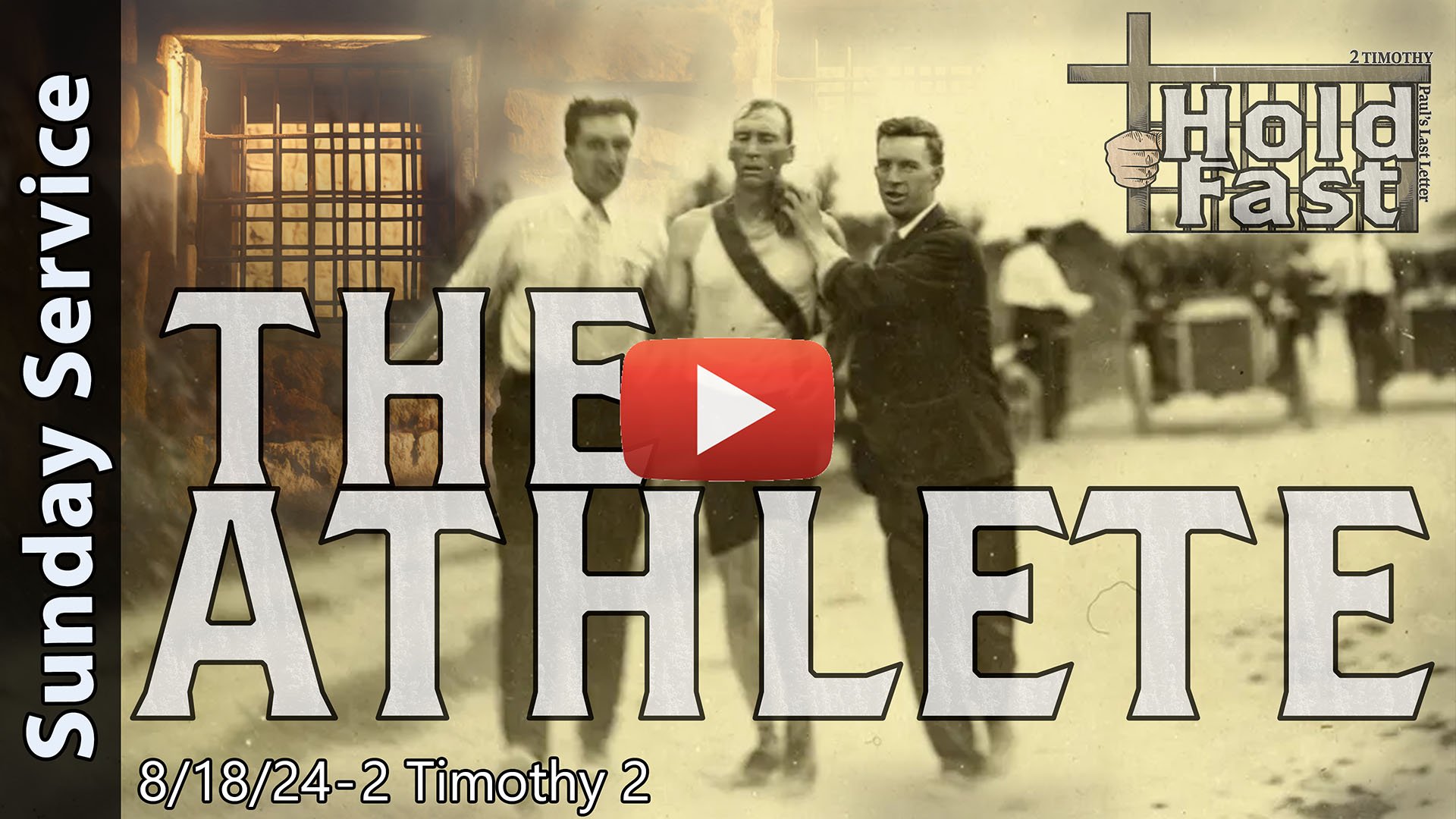
[Sunday] Let My People Go - Hold Fast: 2nd Timothy
All of Scripture is God-breathed; in its inspired voice, we hear the good news, useful teaching, correction, instruction, and training for a life well lived in freedom.
All of Scripture is God-breathed; in its inspired voice, we hear the good news, useful teaching, correction, instruction, and training for a life well lived in freedom.
Questions for the Week: Hold Fast: Paul's 2nd Letter of Timothy - Let My People Go
How does the idea that the Scriptures are "breathed out by God" impact your understanding of their authority and relevance in your life?
Read 2 Timothy Ch 3. What scary things does Paul highlight? Where does he point to find hope?
How can we discern between true and false teachers, and what steps can we take to protect ourselves and others from their influence?
In what ways have you experienced God's freedom in your own life? Share specific examples and how these experiences have shaped your faith.
What Had happened at Grace this week.
[Sunday] Lightning Rod - Hold Fast: 2nd Timothy
Amidst so much irreverent babble and ignorant controversies, it's easy to become entrenched in our "lightning rod" beliefs. What if, instead, we stood in the good news of Jesus?
Amidst so much irreverent babble and ignorant controversies, it's easy to become entrenched in our "lightning rod" beliefs. What if, instead, we stood in the good news of Jesus?
Questions for the Week: Hold Fast: Paul's 2nd Letter of Timothy - Lightning Rod
What do you think a "lightning rod" issue is in your family or community? How does it create division? Can you think of an example?
Read 2 Timothy 2:14-26. How can we better focus on Jesus and His love for us, rather than getting caught up in disagreements? What practical steps can we take to do this?
The sermon emphasized that God's foundation is firm. How does the knowledge of “being His” bring you comfort and peace?
More Info From the Sermon
The Second Testament by Scott McKnight
A Tranlation of the New Testament.
What Had happened at Grace this week.
New Hymn , “Earth and All Stars” (LW 438/LSB 817)
New Classic about Give us this Day our Daily Bread.
Here is Grace’s Recording for Sunday
Listen to the Original
On August 25th 2024 we are singing
“Earth and All Stars” (LW 438/LSB 817)
This Song is in our Hymnal
But Grace has never used it.
1. Earth and all stars!
Loud rushing planets!
Sing to the Lord a new song!
Hail, wind and rain!
Loud blowing snow storm!
Sing to the Lord a new song!
REFRAIN
HE HAS DONE MARVELOUS THINGS.
I TOO WILL PRAISE HIM WITH A NEW SONG!
3. Trumpet and pipes!
Loud clashing cymbals!
Sing to the Lord a new song!
Harp lute and lyre!
Loud humming cellos!
Sing to the Lord a new song! (REFRAIN)
4. Engines and steel!
Loud pounding hammers!
Sing to the Lord a new song!
Limestone and beams!
Loud building workers!
Sing to the Lord a new song! (REFRAIN)
5. Classrooms and labs!
Loud boiling test tubes!
Sing to the Lord a new song!
Athlete and band!
Loud cheering people!
Sing to the Lord a new song! (REFRAIN)
7. Children of God,
Dying and rising,
Sing to the Lord a new song!
Heaven and earth,
Hosts everlasting,
Sing to the Lord a new song! (REFRAIN)
[Sunday] The Athlete - Hold Fast: 2nd Timothy
Paul, with a whiff of sarcasm, pronounces we all know an athlete never cheats in their game, which makes us ask ourselves, “Have we tried to shortcut the faith?
Paul, with a whiff of sarcasm, pronounces we all know an athlete never cheats in their game, which makes us ask ourselves, “Have we tried to shortcut the faith?
Questions for the Week: Hold Fast: Paul's 2nd Letter of Timothy - The Athlete
Think of a time someone cheated at a sport or game. What effect did that have on the final results?
Read 2 Timothy 2:1-13. What do you find most challenging about Paul’s message to endure suffering and hold fast to the Gospel of Jesus?
Can you share a time when you felt like you were taking a "shortcut" in your faith or in life? What did you learn from that experience?
With the hope of the resurrection, how can we support one another when we are facing difficulties and challenges?
What Had happened at Grace this week.
How the 1904 Marathon Became One of the Weirdest Olympic Events of All Time
Athletes drank poison, dodged traffic, stole peaches and even hitchhiked during the 24.85-mile race in St. Louis
History | Updated: June 27, 2024 | Originally Published: August 7, 2012
How the 1904 Marathon Became One of the Weirdest Olympic Events of All Time
Athletes drank poison, dodged traffic, stole peaches and even hitchhiked during the 24.85-mile race in St. Louis
Read the Article at its original site to support their work
https://www.smithsonianmag.com/history/how-the-1904-marathon-became-one-of-the-weirdest-olympic-events-of-all-time-14910747/
America’s first Olympics may have been its worst, or at least its most bizarre. Held in 1904 in St. Louis, the games were tied to that year’s World’s Fair, which celebrated the centennial of the Louisiana Purchase while advancing, as did all such turn-of-the-century expositions, the notion of American imperialism.
Although there were moments of surprising and genuine triumph (George Eyser, a gymnast with a wooden leg, earned six medals, including three gold), the games were largely overshadowed by the fair, which offered its own roster of sporting events, including the controversial Anthropology Days, in which a group of “savages” recruited from the fair’s international villages competed in a variety of athletic feats for the amusement of white spectators.
Skip Ad
The Olympics’ signal event, the marathon, was conceived to honor the classical heritage of Greece and underscore the connection between the ancient and modern. But from the start, the 1904 marathon was less showstopper than sideshow, an absurdist spectacle that seemed more in keeping with the carnival atmosphere of the fair than the reverential mood of the games. After seeing how the event played out, officials nearly abolished it for good.
Some of the athletes competing in the marathon pose for a group photo. Public domain via Wikimedia Commons
The contenders
A few of the runners were recognized athletes who had either won or placed in the Boston Marathon or in previous Olympic marathons. Americans Sam Mellor, A.L. Newton, John Lordon, Michael Spring and Thomas Hicks, all experienced marathoners, were among the favorites.
But the majority of the field was composed of middle-distance runners and assorted oddball characters. Fred Lorz, an American who trained at night because he worked as a bricklayer by day, earned his spot in the Olympics by placing in a special five-mile race sponsored by the Amateur Athletic Union. Other noteworthy contenders included two men from the Tswana tribe of South Africa—the first Black Africans to ever participate in the modern Olympics— who were in St. Louis as part of the South African World’s Fair exhibit. They are fabled to have arrived at the starting line barefoot, though photos show that at least one was wearing shoes.
Len Tau and Jan Mashiani were the first Black Africans to participate in the modern Olympics. Public domain via Wikimedia Commons
Then there was Félix Carvajal, a Cuban national and former mailman who raised money to come to the United States by demonstrating his running prowess throughout Cuba, once trekking the length of the island. Upon his arrival in New Orleans, he reportedly lost all his money in a dice game and had to walk and hitchhike to St. Louis. A 5-foot-1 man, he presented a slight but striking figure at the starting line, attired in a white, long-sleeved shirt; long, dark pants; a beret; and a pair of street shoes. Legend has it that one fellow Olympian took pity, found a pair of scissors and cut Carvajal’s trousers at the knee.
The main event
On August 30, at precisely 3:03 p.m., David R. Francis, president of the Louisiana Purchase Exposition, fired the starting pistol, and the men were off. Heat and humidity soared into the low 90s, and the 24.85-mile course—which one fair official called “the most difficult a human being was ever asked to run over”—wound across roads inches deep in dust. The race was slightly shorter than today’s marathons, which are almost always 26.2 miles. “This was more like cooking than civil engineering,” the New York Times wrote in 2012. “Race directors designed their courses by a sense of feel, not by a fastidious recipe.”
The course had seven hills, varying from 100 to 300 feet high, some with brutally long ascents. In many places, cracked stone was strewn across the roadway, creating perilous footing. The men had to constantly dodge crosstown traffic, delivery wagons, railroad trains, trolley cars and people walking their dogs. Cars carrying coaches and physicians motored alongside the runners, kicking the dust up and launching coughing spells.
There was only one spot where athletes could officially secure fresh water, 12 miles from the start of the race. (Carvajal somehow got a drink at a water tower six miles into the course.) James Sullivan, the chief organizer of the games, wanted to minimize fluid intake to test the limits and effects of purposeful dehydration, a common area of research at the time.
Hicks, an experienced runner from Massachusetts, led the 32 starters from the gun. William Garcia of California nearly became the first fatality of an Olympic marathon when he collapsed on the side of the road some eight miles from the finish. The dust had coated his esophagus and ripped his stomach lining, causing serious hemorrhaging. Had he gone unaided an hour longer, he might have bled to death.
Lordon, one of the Americans, suffered a bout of vomiting and gave up. Len Tau, one of the South African participants, was chased a mile off course by a wild dog. Carvajal trotted along in his cumbersome shoes and billowing shirt, making good time even though he paused to chat with spectators in broken English. The St. Louis Post-Dispatch’s car “passed the little Cuban three miles out, still running at an even gait, and he waved his cap and yelled enthusiastically,” as the paper reported the following day.
Félix Carvajal, a Cuban runner, is rumored to have cut his long pants off at the knee before the race. Public domain via Wikimedia Commons
Report this ad
On one occasion, Carvajal stopped at a car, saw that its occupants were eating peaches, and asked for one. When the strangers refused, he playfully snatched two of the fruits and ate them as he ran. A bit further along the course, he stopped at an orchard and snacked on some apples, which turned out to be rotten. Suffering from stomach cramps, he laid down and took a nap. Mellor, now in the lead, also experienced severe cramping. He slowed to a walk and eventually stopped. At the nine-mile mark, cramps also plagued Lorz, who decided to hitch a ride in one of the accompanying automobiles, waving at spectators and fellow runners as he passed.
Sam Mellor, an American runner, experienced severe cramping during the event. Public domain via Wikimedia Commons
At the time, the rules of the Olympic marathon “allowed runners to be coached and assisted by race officials,” writes George R. Matthews in America’s First Olympics: The St. Louis Games of 1904. Hicks, one of the early American favorites, “received an inordinate amount of coaching and some extraordinary assistance during the marathon.”
At the ten-mile mark, Hicks came under the care of a two-man support crew, whom he begged for a drink. They refused, instead sponging out his mouth with warm distilled water. Seven miles from the finish, his handlers fed him a concoction of strychnine and egg whites—the first recorded instance of drug use in the modern Olympics, which had no rules about performance-enhancing drugs at the time. Strychnine, in small doses, was commonly used a stimulant at the time; today, the Centers for Disease Control and Prevention describes it as a “strong poison” that is “used primarily as a pesticide, particularly to kill rats.” Hicks’ team also carried a flask of French brandy but decided to withhold it until they could gauge the runner’s condition.
Meanwhile, Lorz, recovered from his cramps, emerged from his 11-mile ride in the automobile. One of Hicks’ handlers saw him and ordered him off the course, but Lorz kept running and finished with a time of 3 hours, 13 minutes. The crowd roared. But the cheers quickly turned to boos as the truth came to light. Lorz smiled and claimed that he had never intended to accept the honor; he’d finished only for the sake of a joke.
The brandy-fueled victor
Report this ad
Hicks, the strychnine coursing through his blood, had grown ashen and limp. When he heard that Lorz had been disqualified, he perked up and forced his legs into a trot. His trainers gave him another dose of strychnine and egg whites, this time with some brandy to wash it down. They fetched warm water and soaked his body and head. After the bathing, he appeared to revive and quickened his pace. Race official Charles Lucas wrote:
Over the last two miles of the road, Hicks was running mechanically—like a well-oiled piece of machinery. His eyes were dull, lusterless; the ashen color of his face and skin had deepened; his arms appeared as weights well tied down; he could scarcely lift his legs, while his knees were almost stiff.
Hicks reaches the 20-mile mark. Public domain via Wikimedia Commons
The athlete began hallucinating, believing the finish line was still 20 miles away. During the last mile, he begged for something to eat. Then he begged to lie down. He drank more brandy but was refused tea. He swallowed two more egg whites. He walked up the first of the last two hills, then jogged down on the incline. Swinging into the stadium, he tried to run but was reduced to a graceless shuffle. The St. Louis Post-Dispatch described the moments that followed:
There was not a semblance of the elastic spring with which he had started. He must have heard the uproar about him, but he betrayed no sign of it. He was past that. He did look up once when the din was at its height. He was within a few yards of the finish. His lower jaw was hanging as in imbecility, his eyes stared blankly, but his pitiful expression didn’t change.
Hicks’ trainers carried him over the line, holding him aloft while his feet moved back and forth, and he was declared the winner. It took four doctors and one hour for Hicks to feel well enough just to leave the grounds. He declared, “Never in my life have I run such a tough course. The terrific hills simply tear a man to pieces.” Hicks and Lorz would meet again at the Boston Marathon the following year, which Lorz won—this time without the aid of anything but his legs.
Get the latest History stories in your inbox?
Click to visit our Privacy Statement.
Karen Abbott | | READ MORE
Karen Abbott is a contributing writer for history for SmithsonianMag.com and the author of the books Sin in the Second City and American Rose. Her forthcoming book, Liar, Temptress, Soldier, Spy, will be published by HarperCollins in September.
[Sunday] Not Ashamed - Hold Fast: 2nd Timothy
While Paul sits in dirty chains, he encourages those who hear to view weakness, suffering, and shame not through the lens of the shaming world but through the cross of Jesus.
- When we have wanted to avoid them at all costs to stay away from evil, Jesus prays, “My prayer is not that you take them out of the world but that you protect them from the evil one.”
Questions for the Week: Hold Fast: Paul's 2nd Letter of Timothy - Not Ashamed
Can you share a time when you felt weak but God joined you in your weakness? How can we better embrace our vulnerabilities and trust in God's strength?
Read 2 Timothy 1. Why does Paul call out Phygelus and Hermogenes? When are we tempted to push aside others in pursuit of power?
Are there areas in your life where you feel ashamed? How can we apply the message of the cross to overcome these feelings?
Luke Throwing away His Lightsaber in The Last Jedi
What Had happened at Grace this week.
New Song, Luther's If God Had Not Been On Our Side
Classic song of Martin Luther
Here is Grace’s Recording for Sunday
Listen to the Orginal
On August 11th 2024 we are singing
”If God Had Not Been On Our Side”
This is a song of Martin Luther.
We are using an updated tune
Martin Luther, 1483-1546; tr. The Lutheran Hymnal, St. Louis, 1941, alt.
Tune: Christian Egenolff, 1502-1555
adapted by Ralph Vaughan Williams, from Enlarged Songs of Praise
Arr: Koiné
1. If God had not been on our side and had not come to aid us,
our foes with all their pow'r and pride would surely have dismayed us,
for we, his flock, would have to fear the devil's wolves, both far and near,
.… who rise in might against us.
Their furious wrath, did God permit, Would surely have consumed us
And as a deep and yawning pit With life and limb entombed us.
A hellish storm would o'er us roll From Satan, who desires our soul
And seeks to overwhelm us.
3. Blest be the LORD, who foiled their threat that they could not devour us.
Our souls, like birds, escaped their net; they could not overpow'r us.
The snare is broken— we are free! Our helper and our strength is he
…. who made the earth and heavens.
Hold Fast: 2 Timothy: Paul's Last Letter (Teaching Series)
Paul sits in prison as the weather gets colder. He's writing to his friend Timothy, encouraging him to remember the Gospel and his humble upbringing in it, to watch out for those who are ashamed of the marks of Christ, and for Timothy to bring him a coat. Hold Fast to the humble faith, Timothy!
Hold Fast: 2 Timothy: Pauls Last Letter
Paul sits in prison as the weather gets colder. He's writing to his friend Timothy, encouraging him to remember the Gospel and his humble upbringing in it, to watch out for those who are ashamed of the marks of Christ, and for Timothy to bring him a coat. Hold Fast to the humble faith, Timothy!
Reading Plan
Read around the readings for Sunday
8/11/24
Lamentations 1:1-6
2 Timothy 1:1-18
Luke 17:5-108/18/24
Jeremiah 29:1, 4-7
2 Timothy 2:1-13
Luke 17:11-198/25/24
Jeremiah 29:10-14
2 Timothy 2:14-26
Mark 16:1-89/1/24
Ezekiel 37:7-10
2 Timothy 3:10-4:5
Luke 18:9-149/8/24
Exodus 33:12-23
2 Timonthy 4:6-18
Matthew 28:16-20
[Sunday] Them - Missio Dei
When we have wanted to avoid them at all costs to stay away from evil, Jesus prays, “My prayer is not that you take them out of the world but that you protect them from the evil one.
- When we have wanted to avoid them at all costs to stay away from evil, Jesus prays, “My prayer is not that you take them out of the world but that you protect them from the evil one.”
Questions for the Week: Missio Dei: The Great Sending Part 3 -Them
What motivates a church to circle the wagons and escape from the culture around it? On the other hand, what pushes a church into its mission field?
Read John 17:1-26. Jesus prayed that His disciples would be sent into the world. What does this mean to you? How can we actively participate in God's mission in our daily lives?
We are all sinners. How does understanding this truth impact your relationships with others? How does it change the way you view yourself and those around you?
What Had happened at Grace this week.
The Rise and Fall of Martin Stephan (24')
Even though Martin Stephan had many troubles in this life, and more than likely committed grievous sin, which caused his expulsion from the colony and the church, God nevertheless used him to achieve His purpose here on earth.
Taken from https://leben.us/rise-fall-martin-stephan/
The Lutheran religion did not get off to a fast start in America. None of the early explorers were Lutheran. Most of them were Roman Catholic or Anglican. None of the early settlers were Lutheran. In fact, Lutheranism did not come to America until Gustavus Adolphus, king of Sweden mentioned a planting of a Lutheran colony in 1624, about 125 years after the new land was discovered. His daughter Christina fulfilled this dream by sending over a colony of Lutheran Swedes to settle in Delaware in 1639. While this colony did not last, Lutherans by name have been in the country ever since.
Yet these so-called Lutherans were not always Lutheran. Calvinism, Piet-ism and Rationalism all had an effect on these people. Pastors were uneducated. They fell into trying to reform the rough life of the new land. They would preach both in Reformed and Lutheran pulpits. Even Muhlenburg, the father of Lutheranism in America, was not necessarily always a confessional pastor. This does not mean that there were not any confessional pastors in America. Men, like John Campanius, the Falckners, the Henkels and others stood firmly in their beliefs. On a whole, however, Lutheranism in America suffered.
Then in the early 1800s more and more confessional Lutherans began to come over to this country to escape Rationalism, especially from Germany. Most notably was a Saxon pastor, named Martin Stephan, who brought over a group of immigrants to St. Louis. This group would start what was the most confessional synod in America at that time, the Lutheran Church— Missouri Synod. This synod established confessional Lutheranism in America. Yet when the synod started, they were without their leader. Only a few months after Stephan led this confessional group to America, he was deposed and cast out of the colony for sinful actions. How could this happen? How could a confessional Lutheran pastor, who held so firmly to God’s Word, fall into such evil sins? How could he be disposed so quickly by a people who loved him and had just followed him to the new colony? Were they jealous of him? Were they looking for power? Or was Stephan deserving of this expulsion? These are the questions that we must examine if we are to understand the rise and fall of Martin Stephan.
Martin Stephan was born on August 13, 1777 in Stramberg, Moravia, which is now in the Czech Republic. His parents were originally Roman Catholic but had been converted to Protestantism before Mart-in was born. They raised Martin with a strict training in God’s Word and were teaching him the family trade, as a linen weaver. However Martin’s parents died when he was still young. His pastor, Johann Ephraim Scheibel saw promise in Stephan to be a pastor. So he gave him free access to the church’s library. This reading en-couraged him to become a pastor and gave him his conservative standpoint, which he held throughout his life.1 With the financial help of some Pietists, he was able to go to St. Elizabeth’s Gymnasium in Breslau before attending both the University of Halle and the University of Leipzig.
Stephan, however, did not graduate from either of these universities. Although he was gifted in many ways, Stephan seemed to have little interest in reading the classics, which were required for graduation from a university. Instead he spent much of the time reading the Pietists’s publications.2 He seemed only to be interested in religious affairs.
Upon leaving Leipzig, he served as a pastor in Bohemia for a year. Then in 1810, something happened to Stephan that would change his life forever. He was called to be a pastor at the unique congregation of St. John’s in Dresden.
St. John’s was formed by Bohemian refugees during the Thirty Years’ War. After the war ended, they were granted special rights by the government, even though they were considered part of the state church, because of their nationality. They could have irregular gatherings, which the state church normally prohibited, choose their own elders and pastors, and exercise their own church discipline. All of these privileges are important to understand when examining the rise of Martin Stephan.
Even though Stephan was not qualified to be called as a pastor in the state church because he had not graduated from a university, St. John’s could exercise its freedom and call the Bohemian to be their pastor. They did this at the recommendation of Court Preacher Doring. At first, Stephan did not stir up much interest. However, soon, Stephan’s fame would spread throughout all of Saxony.
Forster reports that in the first ten years that Stephan was there, membership increased six fold. At the end of 1819, St. John’s had over a thousand members.3 There are a couple of reasons for this increase. First, Stephan’s conservative approach to Scripture was in stark contrast to the rationalistic state church of Saxony. People came to see this man, who was preaching something different, and the Holy Spirit was at work through his preaching. Secondly, Stephan had a strong personality and great communication skills. This, humanly speaking, drew people to Stephan and to his church and soon he had many strong supporters.
Thus the fame and power of Stephan spread throughout all of Saxony. “More and more people looked to him for spiritual leadership. When people in trouble came to him for aid and found it, they went away not only, perhaps not even primarily, as converts to orthodoxy, but as personal champions of Stephan.”4 These champions would then in turn tell others about Stephan and soon people would come from all over Germany, from all walks of life to meet this man. He was famous.
One of the men who sought comfort from Stephan was a troubled student named C.F.W. Walther. Walther had sought help from a group of Pietists, but found no comfort. Instead “he was afflicted with serious doubt and suffered the most excruciating pains of spiritual diseases.”5 One of his friends suggested that he write to Pastor Stephan who had a reputation for helping those who could find an-swers to their troubles nowhere else. Walther took this advice and it changed his life.
When Pastor Stephan wrote a letter back to Walther, Walther was so scared that he fervently prayed to God that this letter would not be filled with what he deemed the false comfort of the Pietists.6 Fortunately it was not. Instead of pointing him to his own good works, Stephan pointed Walther to the atoning and universal work of Christ. He set him free from the burden of the law. Through this letter, and many others that were exchanged between these two men, Walther became a convinced Lutheran and an admired follower of Stephan because he had explained the gospel to him.
Despite his growing fame and power, Pastor Stephan’s Bohemian congregation was not completely happy with him. With all the new members that were coming in, they were feeling left out. They did not always welcome the new people that were from a different heritage than they. They liked their little Bohemian congregation with their special privileges and Stephan seemed to be ruining it. They did not think that he was fulfilling his pastoral duties to those who were actually his members.7 He was spending too much time counseling other people.
This led fellow pastors in the area to not be pleased with Stephan as well. It seems as if Stephan had no regard for the so-called “sheep stealing”, meaning taking members from other local congregations without their permission. To accommodate the growing crowds, Stephan had to hold six services every Sunday in both Bohemian (Czech) and German.8
The greatest opposition to Stephan came from his superiors in both the state church and the government. Stephan did not teach the rationalistic beliefs that his superiors in the state church taught. Instead, he held firmly to the truths confessed in the Lutheran confessions. The state church, however, could not depose Stephan because of the right, granted to the Bohemian congregation of St. John’s, that they could choose their own pastor. Instead of removing him, they attacked him in the press.
They attacked Stephan constantly, accusing him of running a sect. They said he was a separatist, who was causing criminal acts by his false, extreme teachings. They made these charges for many years and for the most part Stephan remained silent, letting his followers defend him. A few times, especially before 1823, he responded.
On one occasion in 1821, Stephan decided to defend himself. Writing back to those accusing him, he said, “I am not a member of any sect, old or new;…I am an evangelical Lutheran preacher and I preach the Word of God as recorded in the Bible…I preach the apostolic religion, which Luther preached in its purity with such courage.”9
Yet his accusers continued their attacks. Some would say that they had good reason to do so, not on the basis of what he taught, but on the basis of his actions. Stephan was known for his irregular meetings, especially late at night. These types of meetings were outlawed in Saxony for all people, even for churches, because they feared social riots. However, Stephan was allowed to do them because of the special rights given to his unique congregation. This made the legal authorities suspicious of Stephan.
Stephan claimed that these meetings were open forums, a question and answer session dealing with such things as the Formula of Concord.10 He claimed that he was doing nothing wrong at these meetings. Not everyone believed him. Many people thought that evil sins were being committed during these meetings. These suspicions rose higher and higher throughout the 1830s. No longer was Stephan just meeting with members of his church but he also began going on long walks, late at night with females.
After 1830, Stephan became extremely secretive about what was going on. Often these walks or meetings would be very late at night, going until two or three in the morning and would involve married or unmarried women. Stephan claimed that he needed these long walks to fall asleep and the women were free to come as they chose.11 Coupled with the fact that Stephan and his wife did not have the best marriage and he seemed to give little attention to his eight children, rumors about these meetings arose.
Accusations of sexual misconduct arose, but no matter how hard they tried, the authorities could not prove anything. They had a lot of wild accusations against him but they could not find substantial proof. Newspapers ran stories and cartoons depicting Stephan as a man acting immorally. People began to develop strong feelings and to take sides. Because of this, the authorities tried to dispose him from office. They feared that some sort of a riot would happen.
In November of 1837, the authorities planned a raid on Stephan’s private lodge, where many of these late night meetings took place to try and catch him in the act, but when the police raided the lodge at midnight, they did not find him there. Instead they found only five of his companions deep in conversation. Stephan himself was on a walk with a female companion. When he returned, both he and his companion were questioned for a long time but they would admit to doing nothing wrong.
On the very next day, however, the state was able to gather enough accusations and enough support to suspend Stephan from office. Previously Stephan had been arrested but had always been cleared of accusations. This time, however, was different. This suspension caught both Stephan and his close followers by surprise. They were not prepared for it. They thought that Stephan’s popularity, connected with his unique position at the Bohemian congregation, would save him from suspension. They were wrong. Because of this suspension, Stephan hastened his plans of coming to America.
Already in 1830, Stephan had thrown around the idea of coming to America with some of his closest friends. He had good reason to do so. The state of religious affairs was not very good. There were very few confessional pastors in Saxony. When Stephan tried to unite these pastors around 1830 nothing happened. Plus, the Prussian Union was influencing all those around him. He thought that soon he would be either under their control or under something similar. This led Stephan to say, “Will it not soon come to this that we must leave Babylon and Egypt and emigrate? Where will we turn? In the German states we can find no refuge. Everywhere there is great hatred for the pure Lutheran doctrine…So my eyes are being directed to North America.”12
These plans for emigration really picked up speed after 1836, when more and more accusations were brought against Stephan. Yet this was not the main reason that Stephan gave for his plans. Stephan always blamed the false religions of his day, which were persecuting him. He claimed that these enemies were the ones who were bringing up these false accusations of sexual misconduct so that they could prevent people from flocking to Stephan. There probably was some truth to this. Stephan was being persecuted by his enemies for his sound beliefs. He would never back down from his firm stance on Holy Scripture. By blaming his enemies instead of the accusations, Stephan managed to turn the attention from his actions to his strong confessional stance.13
Stephan was well known throughout the community, and everyone had an opinion on him, either good or ill. All knew of the accusations and his plans to sail to America. Stephan could say, “When my emigration became known, a company of 700 people willingly joined me, even though I had asked no one.”14 This is probably embellished a little by Stephan because it is known that he did ask those close to him in his church to join him.
Those who were close to him, believed that Stephan was such a good man that he would admit it if he did anything wrong.15 They wholeheartedly believed that they were emigrating to America for religious reasons, not to escape allegations of criminal behavior. They believed their pastor when he said, “No hope remains for maintaining the Lutheran Church in our land.”16
It is clear that this is the way that those who went with him to America thought of him. They had no problem subjecting themselves to any of his demands, whether they agreed with them or not. One demand was that Stephan required all people to be confessional. He required that they subject themselves to God’s Word and to the Augsburg Confession.17 He wanted everyone in his colony to have the same beliefs. He also demanded that everyone pay 100 thalers as a fee for the journey to the new colony, no matter what their income. Although most of the notable people were professional, a good number of farmers came over on the trip, as well, who were not as rich. Of course, it was necessary that there be some sort of a fee to pay for the journey across the ocean but it hardly seems fair to charge everyone the same price. Plus, although he denied it,18 Stephan had access to the money and Forster claims that Stephan used this to his advantage by buying stuff to make his journey a little more comfortable,19 both before and during the trip. Later on, when he would be expelled from the colony, the colonists charged Stephan with falsely taking their property. But for now they trusted him and paid the money without question.
Finally in October of 1838, all the preparations had been made and Stephan and his group were ready to set sail for St. Louis in America. Stephan chose St. Louis over other Midwest cities because it was safer. The Native Americans were not as hostile there as they were in Wisconsin or the Dakotas. Plus, St. Louis was a developing town and they could buy land for the colony at a good price.
From November 3rd to November 18th, five ships set sail at different times to America carrying Stephan and his followers. Stephan was the unquestionable leader of this group. He was the one who came up with the idea of moving to America, promoted it and organized it. He decided who would go on what ship and who would be in charge of each ship. Of course, all the important people sailed with Stephan on the Olbers. Stephan probably put all these important people on his ship so that he could keep an eye on them just in case they would try and usurp control.
This seemed to have happened. Stephan became very domineering on the ship. His companions noticed that his attitude had changed once he had boarded the ship. No longer were all wholly devoted to him but some leaders were questioning his authority, most notably Marbach and Dr. Vehse, two lay leaders.20 This led Stephan to become stricter, hoping to squash these subtle attacks. On the ship, he was successful. Stephan was able to convince both Marbach and Dr. Vehse that these actions of theirs were sinful because he had been appointed the leader of this colony.
A few days later, after squashing these attacks, Stephan’s leadership was made official. On January 14th, a day after the first colonists reached St. Louis, as the Olbers was in the Gulf of Mexico, the men on Stephan’s ship elected him bishop of the colony, in charge of both the civil and religious affairs. The four prominent pastors, O.H. Walther, G.H. Lober, E.G.W. Keyl and C.F.W. Walther, signed a document which asked Stephan to accept this position of bishop. The document said,
Your reverence has, according to the gracious council of God, remained standing as the last, unshakable pillar on the ruins of the now devastated Lutheran Church in Germany…accordingly you have already for a long time occupied the position of a bishop and performed Episcopal functions among us…we have been instructed by you in many things in accordance with the Word of God…In consequence of all this, therefore we approach you with the reverent urgent plea: Accept Reverend Father the office of bishop among us bestowed on you by God and grant that we may now express our unqualified confidence in your fatherly love and pastoral faithfulness towards us.21
It is amazing to see the power that Stephan still had over these men. Even though they were now sensing that something could be wrong, he was still elected bishop and given complete control over all things in the new colony. In fact, a month later, as they were on the steamboat close to St. Louis, these men confirmed Stephan as bishop. They pledged their complete loyalty to him on February 16th22 saying,
We affirm and testify before the countenance of the omniscient God, in agreement with the truth, that we have complete and firm confidence in the wisdom and fatherly love of our Reverend Bishop; and we abhor all distrustful, suspicious statements and thoughts, in which he is accused of injustice, harshness, selfishness, carelessness in the administration of our temporal goods…Further we pledge ourselves to submit with Christian willingness and sincerity to the decrees and measures of His Reverence in respect to both ecclesiastical and community affairs.23
News about these documents spread rapidly to St. Louis, where the other members of Stephan’s party had already gathered. In fact, this news spread to all who were living in St. Louis so that many people were waiting for Stephan when his steamboat arrived on the shores of the Mississippi. However they were disappointed.
When the ship arrived in the middle of February, Stephan stayed in his luxury cabin, complaining of a sickness rather than going out. Finally in the middle of the night, he made his way into the city, where a room was prepared for him. Stephan would spend most of his time in St. Louis in this room, distant from all his fellow colonists. He would not let anyone come in to visit him without an appointment, except for those who were really close to him and came out mostly to maintain control.24 Truly Stephan’s attitude had changed from the man who would counsel and talk with all who came to him in Dresden. He had become a different man. His fellow colonists would see this soon.
No one knows for sure what had caused this change in Stephan. He was no longer the man with the engaging personality, standing up for the true Word of God, counseling all who came to him. Instead he had become distant. Maybe the years of accusations had finally taken its toll on him. Maybe his ego had been built up by the constant years of praise that he thought of himself so highly. Maybe he was covering up some sins and his conscience was burdening him. Or maybe it was a combination of a couple of these. No one may ever know what caused this change in Stephan. It quickly became apparent in the new land.
On March 3rd, the first service of this new colony was held at Christ’s Church25 in St. Louis. Stephan, of course, was the preacher. There were a large number of people in attendance at this first service, waiting anxiously to hear Stephan. All, who had made the trip over to America, came. Plus many people from the city of St. Louis attended because the newspapers were constantly running stories, updating people on the actions of this famous Bohemian migrating to America. At this service, however, Stephan did not impress anyone. Apparently Stephan, who was preaching in a church for the first time in about a year because of the suspension and the long boat ride over, did not give an engaging sermon. Two days later, the newspaper stories of this service were kind to these new colonists, calling them intelligent and dignified but they made no mention of Stephan.26 Most of his own people, who had followed him to America, were disappointed in his efforts. Stephan, of course, blamed the people for their lack of faith and their doubting. It was not his fault that the people were not impressed with his sermon but theirs. While he had never been the most engaging preacher, his sermons were now lacking substance. From then on Stephan rarely preached.27
Part of the reason was that Stephan was bishop over both ecclesiastical and civil affairs. He had control over all things in the colony and this took up a lot of his time, especially in the beginning. Stephan had very specific ways in which he wanted his colony run. It took him a month to enforce these demands.28 Plus the colonists had purchased land in Perry County, about one hundred miles south of St. Louis, where they would establish their colony. Before they could move down there, many preparations had to be made. Stephan oversaw most of these preparations.
During this time, from February to April, Stephan was ruling with an iron fist. This once again caused his close followers to question his authority, especially Marbach.29 Marbach wanted a separation of a church and state. He thought that Stephan had too much power and later on this turned out to be true. Whenever these small uprisings would occur, he was able to put them down. As long as he was on the scene, the majority of the people would back their bishop.30 By May of 1839, Stephan thought that he had established enough control over his colonists that he could leave them in St. Louis and make preparations in their new land of Perry County. He went to Perry County with about 200 men, leaving 400 still in St. Louis.
Therefore Stephan was in Perry County on May 5th, trying to get things ready so that the colonists could move down there, when Pastor Lober preached a sermon to the colonists in St. Louis that would change Stephan’s life forever. Lober’s sermon was on the 6th Commandment. In it, he must have mentioned some piercing law that had an effect on a couple of women in the congregation. Two women, independently of each other, without each other’s knowledge, came to Lober that afternoon and confessed that Stephan had seduced them. This shocked Lober and he quickly told C.F.W. Walther. Within a few days, all the prominent clergy had been informed of this heinous crime.
This accusation was the straw that broke the camel’s back. These men, who had been shown the great comfort of the gospel by Stephan, who had defended him against all the accusations in Dresden, who had willingly followed him to a new colony in North America, who had a deep love and admiration for their leader, finally realized that Stephan had been living in open sin. They finally had the proof to make charges against Stephan and take away his power as bishop.
It is amazing the change that took place in these men. Only a year earlier, they had defended their beloved bishop against numerous attacks in Dresden, asserting that Stephan had to be innocent because if he was guilty, he would have confessed.31 Only three months earlier they had elected him bishop over ecclesiastical and civil affairs and affirmed their subjection to him. Now they were making plans to depose him from office. The clergy thought even if he was innocent of these charges, he should resign for the good of the colony.32 Truly these men had seen a change in Stephan.
The clergy set into motion a plan that would depose Stephan from his office of bishop. They concluded since they called him to that position on the boat, surely they had the power to remove him from office. Therefore they leaked out the information to the people. When they did, a few other women came forward with similar accusations of sexual misconduct.33 The clergy even decided to send Walther34 to Perry County to inform the people, who were working on this new place with Stephan, of the accusations.35
Since Walther had gone here without Stephan’s authority, he was not welcomed by Stephan. The people, however, readily accepted him and believed the accusations. They quickly turned against their leader. This shows that they too had seen a change in Stephan and were feeling oppressed by his new domineering personality. They even went into the woods to hear Walther preach on Pentecost instead of listening to Stephan’s sermon.36 The people had been turned against their bishop. Stephan’s fate was sealed. Brought before the Council, and refused the opportunity to defend himself, Stephan was quickly found guilty of adultery, misuse of property and false doctrine, and excommunicated.
They wished to forcefully remove him from his house and send him across the Mississippi River to Illinois as punishment. However there were many logs being floated down the river at this time, which made it impossible to cross. Therefore they put him up in a tent for the night, not allowing him the comfort of his own home. Stephan, recounting this miserable night says, “I was very thirsty and begged only for a glass of water but no one gave me anything nor did anyone care about my health.”37
On the next day, May 31st, before they sent him across the Mississippi, they forced Stephan to sign a document, in which he gave up his rights as bishop. The document says, “I, Martin Stephan…do certify by the discussions that took place on this day…to voluntarily cede and give up control of the above mentioned congregation to her trustees.”38 Then Stephan promises never again to come back to the colony. The document says, “I promise never to come back to the territory of the said company and to the state of Missouri.”39
Even though Stephan signed this document, it did not mean that he confessed to any of the accusations. In fact, he maintained his innocence until the day he died. When he boarded the ferry, which would take him across the River to Illinois, he was still protesting his expulsion but to no avail. When he left, they gave him “the necessary clothing, a cloak, linen, 2 beds, 2 chairs, 1 clock, 1 sofa cushion and its frame, books of meditation and 100 dollars in money.”40 Plus they gave him an axe and a spade so that he could do work.41 At 10:30 AM on May 31st, two days after they formally accused him, Stephan left the colony.
Reverend Stephan never admitted to doing anything wrong, yet the constant attacks on him during the latter years of his life, coupled with multiple women on separate occasions accusing him of adultery were enough to convince the colonists and most people. After the Saxons had disposed of Stephan, his maid, Louise Guenther, confessed to having an affair with him, as well.42 Before they could punish her, however, she fled the colony to join Stephan and lived with him until he died.
Reverend Stephan would be called to serve in several congregations, ending his career at Trinity Church in Horse Prairie, Illinois. He died quietly on February 26, 1845. He is buried in Trinity Cemetery. A picket fence surrounds his grave and a ten-foot cross serves as its marker. According to tradition, his casket was carried around the church three times before he was buried, showing the respect they had for this man.43
Even though Martin Stephan had many troubles in this life, and more than likely committed grievous sin, which caused his expulsion from the colony and the church, God nevertheless used him to achieve His purpose here on earth. Though estranged from C.F.W. Walther, Stephan’s influence on the man most associated with the founding of the Lutheran Church—Missouri Synod was, in retrospect, almost entirely positive. For the broader church, the message is Paul’s message to the Corinthians, “That your faith should not stand in the wisdom of men, but in the power of God.” (I Cor. 2:5)
Bibliography
Bekenntis der Louis Guenther. June 3, 1839. Manuscript from Concordia Historical Institute.
Forster, Walter O., Zion on the Mississippi, Concordia Publishing House. St. Louis, MO. 1953.
Pastor Stephan Stephan, Manuscript from Trinity Lutheran Church in Horse Prairie, IL.
Pledge of Subjection to Stephan Feb. 16, 1839. Manuscript from Concordia Historical Institute
Rast, Lawrence R. Jr., Demagoguery or Democracy? The Saxon Emigration and American Culture. Concordia Theological Quarterly 63.4 (1999), 247-268. Available from http://www.ctsfw.edu/library/files/pb/1767
Sentence of Disposition Pronounced Upon Stephan. May 30, 1839. Manuscript from Concordia Historical Institute
Spitz, Lewis The Life of Dr. C.F.W. Walther. Concordia Publishing House. St. Louis, MO. 1961.
Stephan’s Investiture, January 14, 1839. Manuscript from Concordia Historical Institute
Stephan to Flugal. Oct. 12, 1841. Manuscript from Concordia Historical Institute
Stephan’s Renunciation of the Claims on the Gesellschaft. May 31, 1839. Manuscript from Concordia Historical Institute
ENDNOTES
1 Forster, Walter Zion on the Mississippi. Concordia Publishing House. St. Louis MO 1953. p. 27
2 Ibid., 28
3 Forster, 33
4 Forster, 61
5 Spitz, Lewis. The Life of C.F.W. Walther. Concordia Publishing House. St. Louis MO. 1961. p. 17
6 Ibid., 21
7 Ibid., 32
8 Ibid., 33
9 This is a letter to the paper that is quoted in Forster p. 35
10 Forster, 69
11 Forster, 73
12 Stephan to Kurtz in March of 1833. Quoted by Forster, 87
13 Forster, 107-112
14 Stephan to Flugal. Oct 12, 1841 CHI MSS
15 A quote from Keyl quoted by Forster, 70
16 Protocol of the emigration, May 18, 1838. Quoted by Forester, 137
17 Forster states this on both p. 90 and p. 151
18 Stephan to Flugel 1841. Stephan says, “I had nothing to do with this cash. I did not know, even today, the cash flow or their gifts.”
19 Forster, 167
20 Forster, 282
21 Stephan’s Investiture. January 14, 1839. CHI
22 This is only three months before they would expel him from the colony.
23 Pledge of Subjection to Stephan Feb. 16, 1839. CHI
24 Forster, 325, 353
25 Christ’s Church was an Episcopal Church, which served as the colonist’s church for the first three and a half years they were in the new land, until they could afford to build a place of their own. The colonists would worship either on Sat afternoon or most of the time on Sunday afternoons.
26 Daily Evening Gazette ran an article on March 5th two days after this sermon expressing this. This article is found in Forster, 322-323
27 Forster, 323. Forster references a couple of first hand accounts in support of these statements. He references Winter to Guericke on April 28, 1841 and Hohne to his brother on Sept. 26, 1840.
28 Ibid., 355
29 Stephan to Flugal, 1841
30 Forster, 390
31 Keyl said this quoted by Forster, 70 (see footnote 17)
32 Forster, 394-395
33 Forster, 395-398
34 This was really the first time that Walther is seen as a leader of the colonists. By stepping up during this controversy, Walther was now perceived by the people as the leader.
35 Forster, 403-405
36 Ibid., 409
37 Stephan to Flugal, 1841
38 Stephan’s Renunciation of the Claims on the Gesellschaft CHI MSS Also in Forester, 421
39 Ibid.
40 Ibid.
41 Ephan to Flugal, 1841
42 Bekenntnis der Louise Guenther. MS CHI
43 Pastor Stephan Stephan. MSS from Trinity Lutheran Church in Horse Prairie, IL

![[Sunday] Let My People Go - Hold Fast: 2nd Timothy](https://images.squarespace-cdn.com/content/v1/5852f18a20099e30cd2c01dc/1725044379823-GG1TSRGZRY8X6BU5HEVD/Hold+Fast+4a.jpg)







![[Sunday] All Things - Keep It Simple](https://images.squarespace-cdn.com/content/v1/5852f18a20099e30cd2c01dc/1731687836393-04YTHZK3FOM503Y57MM3/Simple4a.jpg)





![[Sunday] Lightning Rod - Hold Fast: 2nd Timothy](https://images.squarespace-cdn.com/content/v1/5852f18a20099e30cd2c01dc/1724380958991-OUIZZ2EFML212P2CP84U/Hold+Fast+3a.jpg)


![[Sunday] Royal Introduction - Kingdom Way](https://images.squarespace-cdn.com/content/v1/5852f18a20099e30cd2c01dc/1732292654207-IOAL90WWETSNSYJWNI92/KW+1a.jpg)
















![[Sunday] The Athlete - Hold Fast: 2nd Timothy](https://images.squarespace-cdn.com/content/v1/5852f18a20099e30cd2c01dc/1723753850309-TEXPO7OMFKNHBC9VFDLG/Hold+Fast+2a.jpg)



























































































![[Sunday] Not Ashamed - Hold Fast: 2nd Timothy](https://images.squarespace-cdn.com/content/v1/5852f18a20099e30cd2c01dc/1723220103962-9LDTJGWF96Z42ABX1214/Hold+Fast+1a.jpg)




![[Sunday] Under Pressure - Hold Fast: 2nd Timothy](https://images.squarespace-cdn.com/content/v1/5852f18a20099e30cd2c01dc/1725559137453-X2SBAMH5MQ0A7MR04OHV/Hold+Fast+5a.jpg)
![[Sunday] Them - Missio Dei](https://images.squarespace-cdn.com/content/v1/5852f18a20099e30cd2c01dc/1722534522364-8UDXN9OINQLV9G7434VO/Missio+dei+pt3+7a.jpg)










Introducing Him who completes all of creation with everything humanity has to offer.